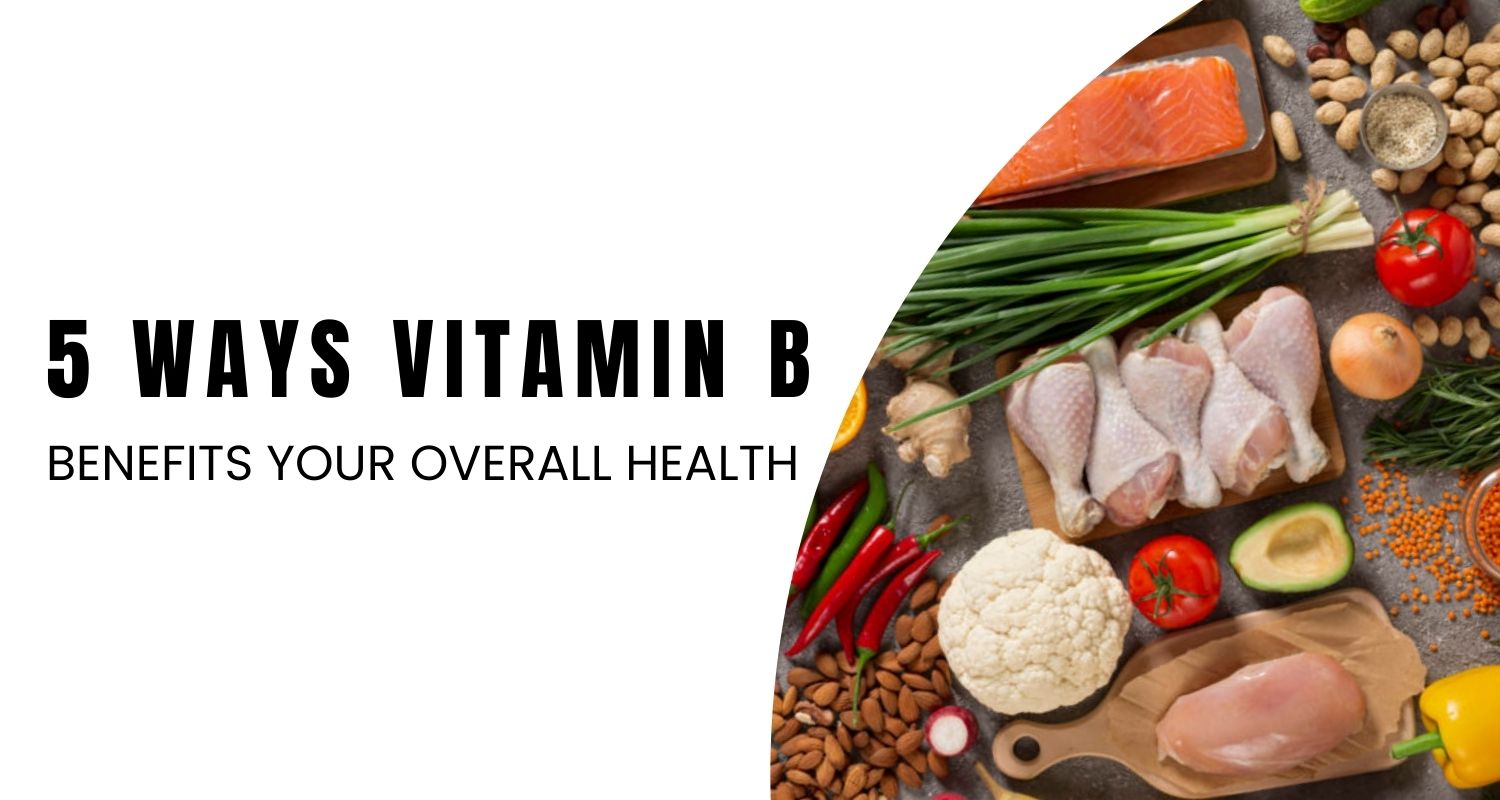In the realm of essential nutrients, few play a more critical role than the B-vitamins. Often grouped as the vitamin B complex, this family of water-soluble vitamins is indispensable for maintaining overall health and well-being.
Vitamin B is a group of water-soluble vitamins, numbered from B1 to B12 (excluding B4, B8, B10, and B11), each with distinct functions. These vitamins are crucial for energy metabolism, neurological function, DNA synthesis, and overall health. Obtained through diet or supplements, B vitamins are found in foods like whole grains, meat, fish, eggs, dairy products, and leafy greens.
Due to their water-soluble nature, regular intake is essential, as they are not stored in the body for an extended period. Incorporating a diverse range of B-vitamin-rich foods is critical to ensuring optimal health.
This blog will delve into the various vitamin B benefits, focusing on the advantages of vitamin B12 and biotin and how they affect our overall health.
1. Vitamin B Benefits for Energy Boost and Metabolism Support
One of the primary Vitamin B complex benefits is its role in energy metabolism. Vitamin B12, in particular, is essential for forming red blood cells, which transport oxygen throughout the body.
This oxygen is crucial for the energy production in our cells’ mitochondria. Additionally, vitamin B12 supports the maintenance of the myelin sheath, a protective covering around nerves that enhances nerve function.[1]
B-complex supplements are often recommended for individuals experiencing fatigue or low energy levels. Regular intake of these vitamins ensures the body’s metabolic processes run smoothly, promoting an overall sense of vitality and alertness.
2. Vitamin B12 Benefits for Supporting Cognitive Function
Beyond its role in energy metabolism, vitamin B12 is instrumental in supporting cognitive function and maintaining a healthy nervous system. Adequate levels of vitamin B12 are essential for synthesizing neurotransmitters, the chemical messengers that facilitate communication between nerve cells.
Research has suggested a link between vitamin B12 deficiency and cognitive decline, making it a key player in preventing conditions like dementia and Alzheimer’s disease. [2]Additionally, maintaining optimal levels of vitamin B12 has been associated with improved mood and a reduced risk of depression.
For those seeking cognitive enhancement or looking to support their mental well-being, ensuring an adequate intake of vitamin B12 through dietary sources or supplements can be a proactive step.
3. Biotin Benefits in Nourishing Skin, Hair, and Nails
Biotin, known as Vitamin B7, is often hailed for its beauty benefits. This water-soluble vitamin is vital for skin, hair, and nail health. Biotin supports the production of keratin, a protein that forms the structural basis of these tissues.
Supplementing with biotin is common for individuals looking to promote healthy hair growth, reduce brittle nails, and enhance overall skin appearance. While obtaining nutrients from a balanced diet is crucial, those with specific beauty concerns may find biotin supplements valuable to their routine.
4. B12 Shots for Weight Loss: Support For Healthy Weight Loss
In recent years, Vitamin B12 injections, often referred to as “B12 shots,” have gained popularity as a potential aid for weight loss. While it’s essential to approach weight management holistically, there is some evidence to suggest that vitamin B12 can play a role in supporting weight loss efforts.
B12 is involved in the metabolism of fats and proteins, and its deficiency can lead to a sluggish metabolism. B12 shots boost energy levels, allowing individuals to engage in more physical activity and burn more calories.
However, it’s important to note that while B12 injections may offer some benefits, they should be considered part of a comprehensive weight loss plan that includes a balanced diet and regular exercise.
5. Vitamin B Benefits Heart Health and Homocysteine Regulation
The B vitamins, specifically B6, B12, and folate (B9), play a crucial role in cardiovascular health by regulating homocysteine levels. Homocysteine is an amino acid that, when elevated, has been associated with an increased risk of cardiovascular diseases.
Vitamin B6, B12, and folate combine to break down homocysteine and convert it into other beneficial substances. Adequate intake of these vitamins can help maintain optimal homocysteine levels, thus contributing to heart health. [3]
Incorporating vitamin B-rich foods or supplements into your diet can be a proactive measure to support cardiovascular well-being.
Conclusion
Vitamin B benefits, including B12 and biotin, extend beyond basic nutritional requirements. Vitamin B is pivotal in our well-being, from enhancing energy metabolism and supporting cognitive function to promoting healthy skin, hair, and nails.
Whether you choose to obtain these essential nutrients through a balanced diet or supplements, it’s essential to prioritize their intake for optimal health. Additionally, if considering specific interventions like B12 shots for weight loss, consult a healthcare professional to ensure the approach aligns with your health needs.
Incorporating Vitamin B into your daily routine is a small yet impactful step towards a healthier, more vibrant life. So, unlock the potential of Vitamin B and embrace its benefits for your overall well-being.
References
2. Behrens, Annika, et al. “Vitamin B—Can it prevent cognitive decline? A systematic review and meta-analysis.” Systematic Reviews 9.1 (2020): 1-21.3. Pawlak, Roman. “Is vitamin B12 deficiency a risk factor for cardiovascular disease in vegetarians?.” American Journal of Preventive Medicine 48.6 (2015): e11-e26.

